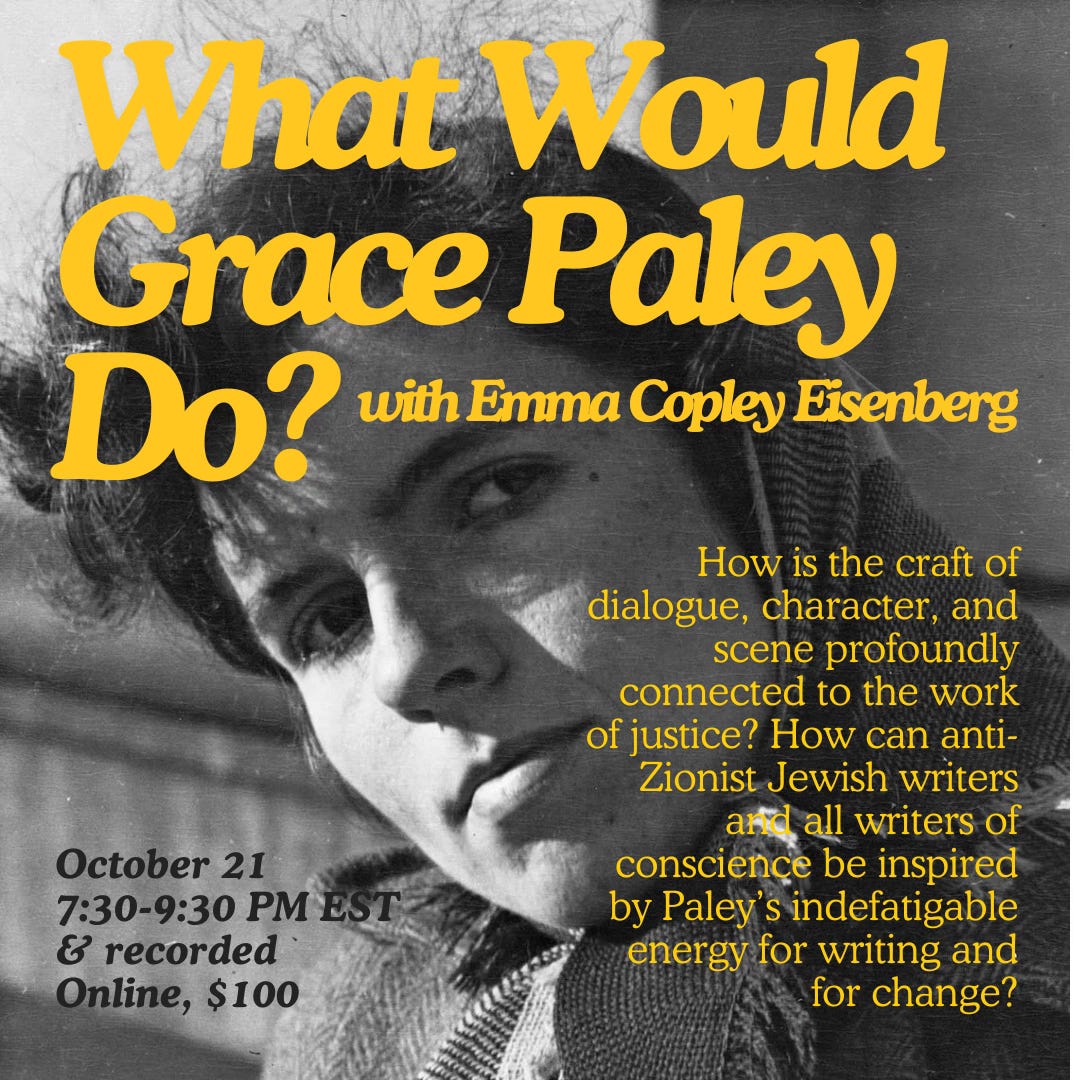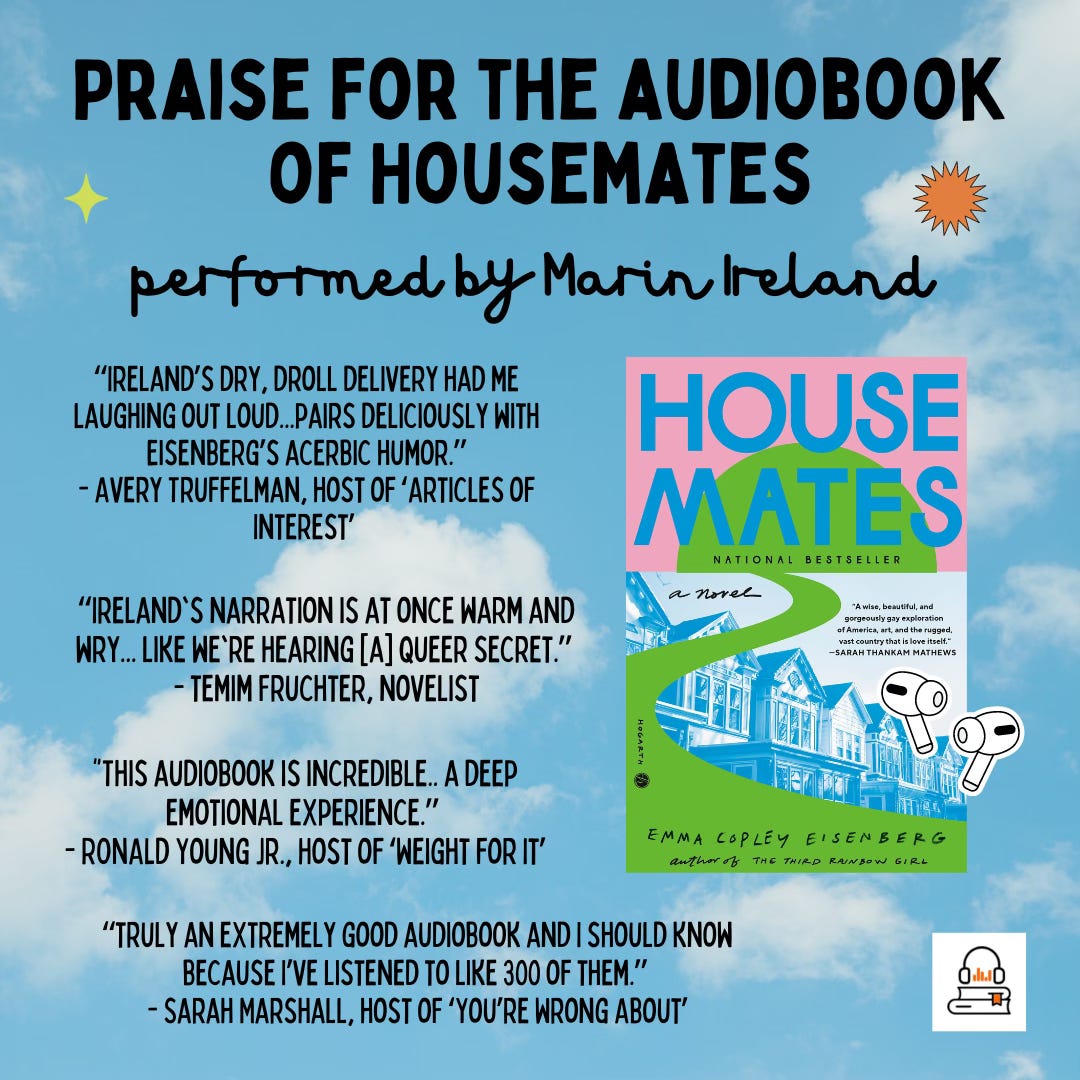At 37
The old ways of being a professional writer are gone but the new ways haven't appeared yet??


Dear Reader,
When I wanted a shot of adrenaline to the heart, I used to read this poem called “At 24” by Irene McKinney. It goes “At 24, I had written and read until my eyes were bloodshot…I kept saying No/to the paper, I kept saying you can’t have me/to the Junior League, to the tiny streets, to impossible/jobs and prissy motherhood. I was certain/there was another way to love and work than the/simian forms evolved so far.”
Simian forms! Sick burn, Irene. I also used part of this poem as an epigraph for my first book, which is about, among other things, some years including the year I was 24. In my twenties, my dominant orientation towards the world was, like McKinney, no. I was saying no to New York City and to being a lawyer or a social worker and to seventh group house meeting about cleaning and to having an iPhone (I was one of those annoying people who had a flip phone until the end) and to marrying a nice guy who loved me well; I was saying no to all of this so that I could say yes to being weird and not knowing and being queer and to writing.
And aha! Here I am. Last year, I wrote here on Substack about what happens when you make your refuge—writing—into your job. “Going into a bookstore now is more likely to fill me with anxiety than joy. I know too much about where the blurbs on the backs of books come from and the factors that contribute to that sign that says BESTSELLER! The business of publishing books often feels dehumanizing, as the value of your mind and heart is measured in dollars and star ratings and likes and prizes and ‘best of’ and ‘most anticipated’ lists.”
I want to be interested in affirming now, in choosing, in saying yes, but to what? So many things I thought I would want to say yes to now seem broken. I keep coming back to that part of the McKinney poem where she says, “I was certain/there was another way to love and work than the/simian forms evolved so far.” But what are they?
Since publishing my debut novel Housemates, I’ve only gotten more and more passionate about talking about the capitalism of how books are bought, sold and brought to market, and how that process often curbs readers’ choices and fosters inequality among writers. The life of a book is put on a certain path from jump, with books that garner the biggest advances tracked towards success and books that garner the smallest advances tracked towards obscurity. (This tracking has only gotten more pronounced in the age of publisher consolidation; everything is different for indie publishers of course; with this book, I was in the lucky and common position of landing somewhere in between these poles.)
If a publisher pays more money for a book, it is in their interest to spend more money to market, publicize, and push that book to booksellers through their sales reps in an effort to recoup their investment. In effect, this means that if you’re a reader, big publishing houses are taking your choices away from you, only telling you about the perhaps twenty books a year they want you to buy. So many amazing books that are doing strange or interesting things will never reach you. And if you’re a writer it means that even within your own publishing house, staffed by kind and cool people who believe in all their titles, they must invest most of their time and effort in just a few. There has to be another way.
I recently joined the National Writers Union, via the Freelance Solidarity Project, which offers some amazing member benefits, including press passes, free legal assistance, access to vision and dental healthcare, contract and grievance help, copyright infringement assistance, and even a network of writers willing to host you for free while on your book tour. But I’m thinking about how very deeply and badly writers of books and articles still need a much more robust and powerful labor union that protects our interests against things like AI and offers us health insurance like the Writers Guid of America East and West, the union that protects TV and movie writers, or SAG-AFTRA, the union that protects screen actors and radio artists, or Actors Equity, the union my father worked for, which protects stage actors.
At 24, I thought that there were people out there who knew things about literature and that if I was ever lucky enough to publish books, they would get reviewed by these people, and get praised or rejected for legitimate reasons related to the quality of my work. But this kind of rigorous criticism of books has mostly been replaced by glorified PR. Publicists consider any mention of a book at all in any publication a win. Real reviews are harder and harder to come by, with mostly the “big books” (see above) getting reviews. (None of this is critics’ fault; for an excellent conversation on how critics want to review deeply but can’t because of how poorly they’re paid and the ways books coverage has been slashed in most publications read this.) The New York Times Book Review has moved more and more towards listicles and plot summaries. This piece called “The NYT Book Review is Everything Book Criticism Shouldn’t Be” argues, “The Review is famous as an arbiter of taste and quality. But the publication utterly fails to seriously engage with books and the publishing industry.” (I actually wanted more from this article and would welcome many follow up or spin off pieces.)
So from whence do we draw our meaning and find our supporters if we’re not getting these things from the places we thought we would? Housemates is barely in the rearview mirror but I’ll share that the things that have so far provided me with the best reflection of if I accomplished what I set out to do — write a book about whether art can save your life, the strange and beautiful intimacy of group houses, West Philly, and how to be a queer non-man artist in love with another queer non-man artist — came from many beautiful and unexpected places.
They came from detailed reviews from literary readers on BookTok. In fact, TikTok was a place I found some of the most meaningful engagement with my book as well as the most engagement with readers younger than I (I was interviewed over on
’s Substack about how and why I, an elder millennial, decided to invest in using the platform). They came from nuanced, thoughtful shelf talkers from booksellers taped to bookshelves in independent bookstores. As DMs on Instagram. As meandering essays in people’s Substacks. As questions asked in podcast interviews and at in-person events.These things feel real and true and packed with feeling and also not yet quite legible. They aren’t the things you list on CVs or websites or put in cover letters for academic jobs or that committees write in award citations. I wonder when the creative industries we need to survive will catch up to the new reality of how books make an impact now and how that impact is articulated.
At 37, I feel most interested in being alive. How did that happen? That song, “Being Alive,” from the Sondheim musical Company comes back. It was my father’s favorite; he would play it at top volume over and over again, a thing I found annoying and which I too now do! The musical begins when the main character turns 35 and ends with this song, where one of his friends says, “You’re not a kid anymore; I don’t think you’ll ever be a kid again, kiddo.” Sob.
My friend the writer Annie Liontas recently told me that after 35 all the coping mechanisms you used to make it to 35 stop working. I wonder if that’s what I’m feeling now. I wonder what, for all of us, is coming next.
Yours,
Emma
Toppings
The 2nd Annual Philly Fat Con was just…the best. If you woke up in despair, here is a video of fat people being so hot to cheer you up.
It’s Aimee Mann season again hehe — here’s a playlist my friend
made if you need a place to start.Join me in donating to Beloved Asheville, an on the ground organization that has been working in Asheville for years that is now providing relief in the aftermath of Hurricane Helene. Yet again Appalachian communities are taking care of their own without much federal support and every dollar counts.
The audiobook of Zaina Arafat’s You Exist Too Much is very good. Everyone bills this as being about a “chaotic Palestinian-American bisexual” but I find it much sadder and more interesting than that. It’s about a woman who can’t figure out how not to flee from herself and everything she loves and so she takes herself to Sex and Love Addict addiction recovery. It is also absolutely about Palestine and life under occupation. I’ve been listening to it on my way to and from therapy, which is, I think and Zaina agreed, fitting.
One more time for the cheap seats in the back! This is tomorrow, Monday October 21 via the Shipman Agency though you can sign up even if you can’t attend live and just watch the recording at your convenience. Since the definition has become hotly contested, here’s what I mean by anti-Zionist.
And I’m teaching a second class for people who want to write fiction but aren’t sure where to start on November 2nd via Tin House, though you also don’t have to attend live. This craft class is designed to help you jumpstart the fiction writing practice you truly want. Perhaps you have an idea for a novel or collection of short stories but don’t know where to start, perhaps you are able to write the “bones” of characters but don’t seem able to add “flesh”, perhaps you’ve been writing journalism or cultural criticism and want to make the leap to fiction, or perhaps you are contending with deeply held blocks about whether you are “worthy” or “talented” enough to truly commit to a project. Students will leave ready to dive in.
Book Scoop
I still have events coming up in Hudson, NY, Delray Beach, FL, Northampton, MA, and Miami. Come hang!
The audiobook of Housemates is very special because it is narrated by the one & only queen Marin Ireland! (She also did the audiobook of Kevin Wilson’s Nothing to See Here among many others and is an iconic Broadway actress and TV star of Umbrella Academy. She has touched Elliott Page, so I basically have too now). The good folks at PRH audio asked audio superstars Sarah Marshall (You’re Wrong About), Ronald Young Jr (Weight For It), and Avery Truffelman (
) among others to say nice things about it and they did!






People who aren’t on TikTok associate it with commercial fiction but the best part about Lit Tok are all the creators championing weird and under the radar books!
"My friend the writer Annie Liontas recently told me that after 35 all the coping mechanisms you used to make it to 35 stop working." Oof. Excuse me while I stare at the wall contemplating that.
I'm not a writer myself but this was an interesting look at the business, thank you.